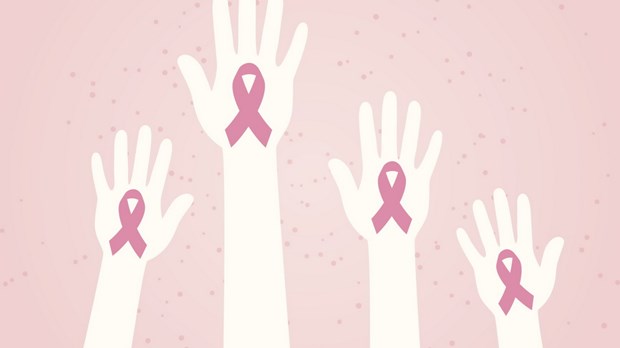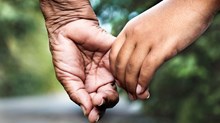Caring for Friends with Cancer

My cell rang, and I looked for someplace private to take the call. I walked into the garage and closed the door to my office, which happened to be my car. Sitting inside the car, inside the garage, I found my familiar haven. With three kids and a constant stream of places to be, things to do, people to talk with, this place became my refuge, my place to regroup and sometimes even catch a nap. This time, however, I can’t remember even breathing. I fumbled to open the storage compartment to grab a pen and whatever paper I could find. The doctor said in a matter-of-fact tone: “I have your biopsy results. The pathology report shows you have invasive lobular carcinoma.”
I scribbled down the words, trying to sound them out. Something about pathology and those three foreign words. I cleared my throat, scribbled little circles on the corner of the paper to start the ink flowing again, and asked: “Wait. What does this mean?”
“I’m sorry. The biopsy shows you have breast cancer.”
I had no words.¹
Three days before that call from the doctor, my appointment for an annual mammogram turned into a three-hour ordeal, which included an ultrasound followed by a core biopsy. I left the medical office feeling shocked and bewildered. Exposed. Violated.
When I called my husband, the familiarity of his voice allowed space for me to lower my weakening attempts to maintain composure. Tears of confusion, fear, and disbelief silently dotted the sidewalk as I tried to explain what had happened. I stood on the crowded sidewalk and held back the growing urge to let out, in a deep guttural cry, the slew of emotions tumbling inside. Somehow I managed to make my way back to the car. Once inside, I tried to calm down and look out the window as cars passed by. Everyone going somewhere. And I sat and watched. My life—a sudden standstill.
A story a friend shared two months earlier in a noisy food court at the mall returned to me—about the “Asian Martha Stewart.” This woman had it all. The way she dressed, how her kids looked, her home, and the food she prepared—everything she did was, in a word, flawless. But she was diagnosed with breast cancer, and when my friend tried to reach out to help her she refused. She didn’t want to be a burden or put people out. She shut down emotionally. When the harsh cancer treatments devastated her body, she could no longer hold her perfect world together. Tragically, she committed suicide and left behind her husband and two children.
Now with my own cancer diagnosis, I stood at the same crossroad with the decision of whether I would stay in the familiar place of being the in-control strong one or take the braver road to let people into my honest thoughts and emotions.
Transparency is the willingness to share difficulties one has undergone after the fact. Vulnerability is sharing difficulties raw, in real time, without the lesson-learned end of the story. I was comfortable with transparency, but vulnerability? Not so much.
I ended up meeting with three friends who lived within 10 minutes of me. I knew they wouldn’t try to talk me out of how I felt, or carelessly quote Bible verses, or try to hyper-spiritualize the situation. They knew how to sit with me in my raw emotions.
No fixing.
No advice giving.
Just listening. And being present with me in my fear and confusion.
No two people share the same cancer journey just like no two people share the same fingerprints. When it comes to cancer, the timetable, treatment plan, response, and resources differ from person to person. While I draw on my own experience battling cancer, I know each person will seek the best decisions possible with the information presented.
If you are a friend to someone facing a cancer diagnosis, please know your care is invaluable. I found the following to be helpful as we entered our cancer journey. These may or may not apply to your specific situation, but my hope is what is shared will be practical as you seek to help your friend or family member.
What Helped
Safe people who knew how to empathize
Friends who didn’t try to fix, hyper-spiritualize, or talk me out of my feelings proved most helpful. I found my emotions would move through the entire spectrum of feelings, sometimes all in the same hour. Friends who knew how to be with me and contain my feelings helped me process the challenge of having life derailed.
Having a centralized place like CaringBridge (a free online medical blog) to disperse important information
Once word got out about my cancer diagnosis, concerned friends and family started calling our home asking the same few questions. My husband and I would sit outside in the backyard to escape the constant ringing. Once the blog site was available, people could check in for updates and prayer requests and leave guest book messages for me to read later.
Prayer
I found the chemotherapy treatment especially challenging. Some nights I would cry in my pillow and ask God to wake people to pray for me. I didn’t think I could make it to morning. After normally sound sleepers shared with me about being woken up in the middle of the night to pray for me, my perspective on prayer drastically altered. God truly hears our prayers.
What Hurt
Unsolicited advice
I knew friends were concerned and wanted to help. A letter about cancer cures from Johns Hopkins was forwarded to me several times by different friends. (Snopes.com exposed the article as a hoax.) I already felt overwhelmed by the mounds of literature I had received from my doctors and needed support rather than more options and opinions. It’s important to give people space to be on their own path with the disease.
“Look on the bright side” comments
One of the most helpful videos I’ve seen about empathy comes from author Brene Brown. When a person uses the phrase “at least,” they no longer show empathy. “At least you caught it early.” “At least your cancer is stage 3 and not stage 4.” “At least your hair will grow back. After all, it’s just hair.”
The phrase, “Call me if you need anything”
I used to say the same with deep sincerity. If a friend needed help, I would be willing to get up at three in the morning. But being on the other side of illness, I realized I didn’t have any strength left in me to call. For all the offers of, “Call me if you need anything,” I don’t remember ever doing so. But I did respond when friends offered specific help: “I’d like to take your son to football practice.” “Can I drive you to an appointment?” “Where can I sign up to bring you a meal?”
Cancer is a frightening, unwelcome foe. As with any trial, God is present and he often uses his people to be the hands and heart to help us through the dark days. This is his design for community. Loving well those who hurt is often as simple as offering your presence.
¹Excerpt from “Warrior In Pink,” Chapter Two: Sunbeams and Southern Accents
Vivian Mabuni joined staff with Cru 25 years ago and currently serves on the Epic National Field Ministry Team (the Asian American ministry of Cru). An international conference and retreat speaker, she recently joined the Speakers Bureau for Susan G. Komen, Orange County. Her first book, Warrior In Pink: A Story of Cancer, Community and the God Who Comforts (Discovery House Publishers) released in April. Vivian has been married 23 years to her husband, Darrin, and is a mom to three wonderful kids, Jonathan (21), Michael (17), and Julia (12). Connect with her at on Twitter, Instagram, or on her website VivianMabuni.com.
Read more articles that highlight writing by Christian women at ChristianityToday.com/Women
 Read These Next
Read These Next

 Loved by a Listening FatherPsalm 141
Loved by a Listening FatherPsalm 141
 Christian MindfulnessLearning how to be awake and alive
Christian MindfulnessLearning how to be awake and alive








 Homepage
Homepage